Algerian National Navy
The Algerian Naval Force (ANF; Arabic: القوات البحرية الجزائرية, French: Forces navales algeriennes) is the naval branch of the Algerian military. The naval force operates from multiple bases along the country's nearly 1,440 km (890 mi) coastline, fulfilling its primary role of monitoring and defending Algeria's territorial waters against all foreign military or economic intrusion. Additional missions include coast guard and maritime safety missions as well a projection of marine forces (fusiliers marins). Algerian forces are an important player in the Western Mediterranean.
| Algerian Naval Force | |
|---|---|
| Arabic: القوات البحرية الجزائرية French: Forces navales algeriennes | |
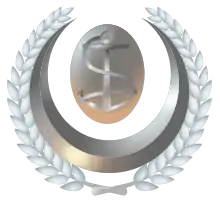 Algerian Naval badge | |
| Active | 1516-1827 1963 – Present |
| Country | |
| Branch | Navy |
| Role | Naval warfare |
| Size | 30,000 personnel[1] |
| Part of | Algerian People's National Armed Forces |
| Garrison/HQ | L'AMIRAUTE, Algiers |
| Anniversaries | February 2, 1967 |
| Equipment | 201 vessels, 30 helicopters, 2 MPA Aircraft |
| Commanders | |
| Current commander | Mohammed Al-Arabi Hawalli |
| Insignia | |
| Naval Ensign | 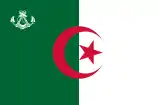 |
As with other Algerian military branches, the naval force was built and structured with assistance from the Soviet Union during the Cold War, but has also relied on other sources for equipment in some areas. Since the end of the Cold War, Russia has remained an important partner, but Algeria has increasingly sought additional sources for equipment as well as building its own shipbuilding capacity.
History
The Algerian Naval Force played an important role in the western Mediterranean between the sixteenth and eighteenth centuries. It was a leading military force that ensured not only the defense of the Regency of Algiers, but also of international shipping traveling through the Mediterranean. Notable legendary leaders were the Barbarossa brothers, Kheir Edine and Hassan Agha.
The origins of the Algerian Naval Force (1147 - 1516)
At that time the Maghreb under the control of the Almohad dynasty which also ruled the current Spain "al-Andalus" and 1147 to 1269. The Naval Force was born with the installation by Abd El Moumen naval shipyards the Almohad empire in the ports of Oran and Honaine. But the reign of this great dynasty would soon be glazed at first by a few internal disagreements, mainly related to the difficulties of managing a vast territory. The situation worsened further when a part of the Iberian peninsula again passed under the control of Christian rulers in the wake of the Battle of Las Navas de Tolosa, the decomposition of the kingdom accelerated with the formation of three states in North Africa. After the total destruction of the kingdom Almohad in 1269 a fierce battle began between Muslims and Christians for control of various ports in the Western Mediterranean, resulting in the occupation by the Spanish in several regions – Algcomme, the Peñon of Algiers, Oran and Bejaia, which led the indigenous peoples of these regions to call on pirates to free the Christian invaders, which was done through sending and Aroudj Hayreddin Barbarossa brothers in 1516, they managed to build a fleet.
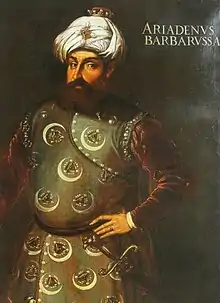
The privateer Oruç Reis, eldest of Khayr ad-Din
Described by some historians as one of the greatest naval admirals in history, the Barbarossa brothers would probably be of Albanian origin, several hypotheses are cited in this regard but none of them have been confirmed definitively, however, the general trend that emerges from the various historical references tends to reinforce the former. In the description given to them, It is said that the youngest Kheire Edine was brighter and stronger corpulence as its big brother while Aroudj Kheir Edine was known for his knowledge in navigation and maritime battles, he was nicknamed Barbarossa . He engaged in piracy for the sole purpose of revenge crossed, especially following his imprisonment for several years in the jails of the Christian rulers, courage and great skill allowed him to escape, fleeing afterwards to Tunis where King Mohamed Ibn Hafss allowed him to build a naval base from which he managed to be the first steps of its military fleet. He moved later to head its fleet to Algeria to its liberation from the Spanish colonization. What he managed to do by releasing initially Algiers, which he conferred the status of capital of a new Algerian state, several years later, he reunites his fleet and left immediately to conquer the last bastion Spanish in Algeria Mers El Kebir, he managed to free.
Phase of construction and consolidation
After the liberation of all the regions that were under Spanish influence, it was therefore quite possible to consider the construction of the Algerian Naval Force, which was undertaken by building initially of four small ships war, over time, a real military industry was born through several shipyards (especially in Cherchell, Bejaia and Algiers) who provided the Algerian Naval Force a considerable number of warships equipped with cannons developed entirely by skills Algerian. From there a new page was opened for Algeria which through its Marine could impose its leadership in the Mediterranean for nearly three centuries.
This rule also allowed him to repel several attacks from a number of European countries, starting with the one that was led by Charles V in October 1541, the troops of the latter were severely defeated by the Algerian fleet which was then under the command Hassan Agha, other attacks were carried out by the Spaniards in the 16th and 17th centuries, but they were all rejected by the Algerian Naval Force.
Other attacks of importance, the American expedition of 1815 and one that led the British and Dutch Marines on Algiers in August 1816, the latter suffered great losses and were prevented from landing at Algiers. However the Algerian armada also lost a large number of vessels.
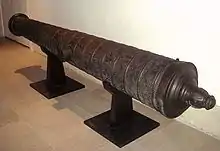
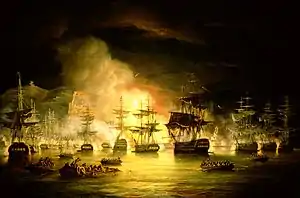
Some Algerian squadrons took part to the Greek war of independence from 1821 on, as suppletive forces to the Ottoman fleet, and lost several ships in various engagements throughout the war.
In June 1827, Charles X launched a naval blockade on Algiers and three years later a military expedition which finally took the city in 1830. Algeria, endured for a century and 132 years of French rule until July 5, 1962, when the country regained its independence. The Algerian Navy was officially recreated in 1963 by the Ministry of National Defence, then located at Hotel St. Georges.[2]
Bases
Principal naval bases are located at Algiers, Annaba, Mers el-Kebir, Oran, Jijel and Tamentfoust. Mers el Kébir is home to the OMCN/CNE shipbuilding facilities where several Algerian vessels have been built. Algeria's naval academy at Tamentfoust provides officer training equivalent to that of the army and the air force academies. The naval force also operates a technical training school for its personnel at Tamentfoust.
Equipment
The bulk of the Algerian Naval Force is still based on Cold War designs, although work is being done to both acquire new platforms as well as modernize existing equipment. The surface fleet is equipped with a mixture of smaller ships well suited to coastal and Exclusive Economic Zone (EEZ) patrol work. The fleet is led by three Koni class frigates which have been updated with more modern systems. These are due to be augmented in the coming years by a pair of MEKO A-200 frigates which will represent the most modern equipment of the naval force when they enter service, also, Algeria signed a contract with China Shipbuilding Trading Company for the construction of three light frigates about 2,800 tons full load. A mixture of six corvettes and off-shore patrol vessels complement the frigates, while a large number of smaller boats cover the role of coastal patrol. Algeria had maintained a relatively large fleet of Osa class fast attack craft by the end of the Cold War, but it is questionable whether any of these remain in operational use.
Algeria has had a small submarine presence in the Mediterranean with a pair of Kilo class patrol submarines, though the recent acquisition of an additional four upgraded boats will expand this presence significantly. Their amphibious warfare capacity has traditionally been limited with a small group of landing ships essentially for coastal transport roles. This capacity will be greatly upgraded with the planned acquisition of an amphibious transport dock capable of supporting more robust operations. In the area of civil support, the purchase of seagoing rescue tugs will mark the first ability of an African nation to provide valuable services to economic and commercial operators in the Western Mediterranean.
The Algerian military has long maintained a strong veil of secrecy over its organization and equipment, making an exact accounting of operational vessels difficult to ascertain. Open sources are known to vary widely in their reports of several aspects of Algerian equipment.
Submarines
| Class | Image | Origin | No. | Ship | Year Commissioned |
Note |
|---|---|---|---|---|---|---|
| Submarine (6) | ||||||
| Project 636 | 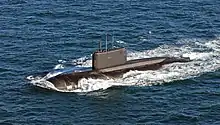 |
4[3][4] | Messali el Hadj (021) Akram Pacha (022) El Ouarsenis (031) El Hoggar (032) | 2010–2019 | Two project 636M in service since 2010. Two project 636.1 ordered in 2014, commissioned in early 2019.[5][6][7][8] | |
| Project 877EKM | 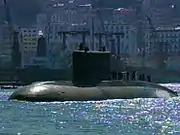 Rais Hadj Mubarek |
2 | Rais Hadj Mubarek (012) El Hadj Slimane (013) | 1987–1988 | Two original Kilo-class submarines in service, delivered in 1987 and 1988.[5] Refitted and upgraded in 1993 and 1996. 2 more on order to be delivered in mid 2021/22[9] | |
Amphibious warfare vessels
| Class | Image | Origin | No. | Ship | Displacement | Year Commissioned |
Note |
|---|---|---|---|---|---|---|---|
| Amphibious transport dock (1) | |||||||
| San Giorgio-class amphibious assault ship | 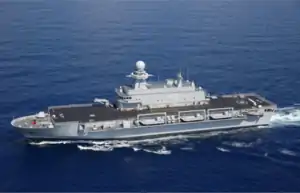 |
1 | Kalaat Béni Abbès | 9,000 tonnes | 2015 | Improved San Giorgio, Ordered in 2011(+1 in option)[10][11][12]' | |
| Landing Ships (2) | |||||||
| Kalaat Beni Hammed | 2 | Kalaat Beni Hammed | 2,450 tonnes | 1984 | Built by Brooke Marine in Lowestoft, UK | ||
| Kalaat Beni Rached | Built by Vosper Thornycroft in Woolston, UK | ||||||
Surface combatants
| Class | Image | Origin | No. | Ship | Displacement | Year Commissioned |
Note | |||
|---|---|---|---|---|---|---|---|---|---|---|
| Frigates (8) | ||||||||||
| MEKO A200 | 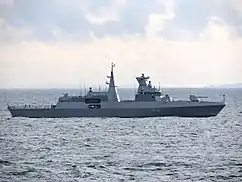 |
2 | Erradi (910)
El-Moudamir (911) |
3,700 tonnes | 2016-2018 | Two in service with the option for two more.[13] | ||||
| Adhafer-class frigate | 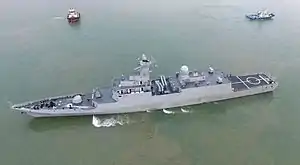 |
3 | Adhafer El Fatih Ezzadjer |
2880 tonnes | 2015-2016 | Armed with NG-16-1(76 mm) main gun, 2 Seven-barrel 30 mm Type 730 CIWS, 2 Quad C-802 missiles[14] | ||||
| Koni-class frigate | 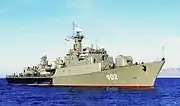 |
3 | Mourad Rais Rais Kellik Rais Korfo |
2000 tonnes | 1985 | Modernized in Russia in 2011.[15] | ||||
| Corvettes (10) | ||||||||||
| Nanuchka-class corvette[16] | 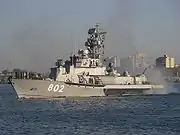 |
3 | Ras Hamidou Salah Reis Reis Ali |
660 tonnes | 1982 | In service, Project 1234E built by Vympel Shipyard in Rybinsk, modernized in 2012. | ||||
| Djebel Chenoua Class corvette |  |
4 | Djebel Chenoua El Chihab El Kirch Hassan Barbiear |
540 tonnes | 2002 | Built by OMCN / CNE in Mers-el-Kebir, Algeria.
Armed with 4C802 ASM and AK630 CIWS. | ||||
| Steregushchiy-class corvette | 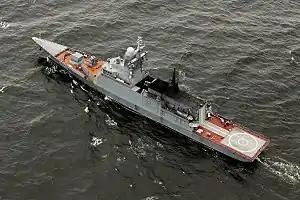 |
3 | 1800 tonnes | 2021 | 3 Project 20380 Steregushchiy Class corvettes. Reception in 2021[17][18] | |||||
| Patrol Boats (65) | ||||||||||
| Osa II class missile boat | 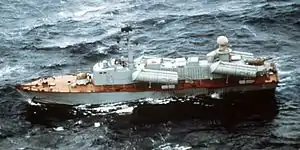 |
8 | 1978 | |||||||
| Kebir class patrol boat | 14 | El Yadekh | 250 tonnes | 1982 | The first two units built by Brooke Marine. | |||||
| FPB98 MKI Ocea class patrol boat | 31[19] | Denebi | 2008-2019 | Built by Ocea France[20][21] | ||||||
| Alusafe 2000 | 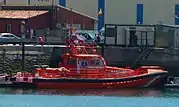 |
12[22] | El Mounkid | 2016 | Produced locally[23] | |||||
| Mine countermeasures (2) | ||||||||||
| Lerici-class minehunter |  |
2 | El-Kasseh 1 El-Kasseh 2 | 600 tonnes | 2016-2018 | In service[24] | ||||
Fleet auxiliaries
| Class | Image | Origin | No. | Ship | Displacement | Year Commissioned |
Note |
|---|---|---|---|---|---|---|---|
| Survey ship | |||||||
| El Idrissi | 673 | El Idrissi | 540 tonnes | 1980 | Built by Matsukara Zosen in Hirao, Japan. | ||
| Training ship | |||||||
| Soummam | 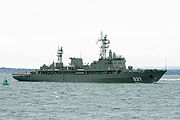 |
937 | Soummam | 5,500 tonnes | 2006 | 5,500 tons (full load). | |
| EL Mellah | 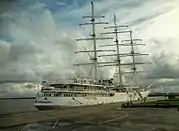 |
938 | El Mellah (the sailor) | 2017 | A three mast tall ship constructed in Gdańsk, Poland. | ||
| Salvage ship | |||||||
| El Mourafik | 261 | El Mourafik | 600 tonnes | 1990 | Built in China | ||
| High Seas Tow Vessel | |||||||
| El Mounjid |  |
701 | El Mounjid | 3,200 tonnes | 2012 | Type UT 515 CD built in Norway and Motorization by Rolls-Royce. | |
| 702 | El Moussif | ||||||
| 703 | El Moussanid | ||||||
Aircraft
.jpg.webp)
| Aircraft | Image | Origin | Type | Variant | In service | Notes | |
|---|---|---|---|---|---|---|---|
| Helicopters | |||||||
| Westland Super Lynx | 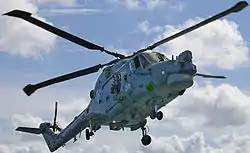 |
ASW | 130/140 | 10 | [25] | ||
| AgustaWestland AW101 | .jpg.webp) |
SAR / utility | 6 | [26] | |||
| AgustaWestland AW139 | .jpg.webp) |
light utility | 3 | [26] | |||
| Kamov Ka-27 | .jpg.webp) |
SAR / utility | Ka-32T | 3 | [27] | ||
| Super King Air | 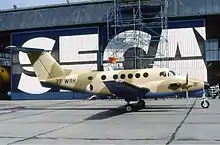 |
maritime patrol | 350 | 3 | [27] | ||
Modernization
.jpg.webp)
The Naval force is currently being upgraded with the following technological developments: the existing units are being modernized, with the submarine force strengthened by two new Kilo class submarines (last generation).[28]
- One LPD from Italy in 2014.
- Two MEKO A200 frigates from Germany.
- TYPE 054A frigates
- AIP Submarines
- Three corvettes C28A with option of three more produced locally. Radar and electronic equipment will be supplied by Thales, and mounted in Algeria. They will be built at Hudong Zhonghua Shipyard.[30][31]
- 31 units of the type FPB98 MKI Ocean Patrol Boat.[32][33]
- 12 units of Alusafe 2000 high speed rescue and patrol vessel.[34]
Munitions
SAM
- Umkhonto (missile)[35]
- Aster (missile family)[36]
- HQ-7A (FM-90) - on board C28A Class Corvette .
- 9M33/SA-8 - Osa-M (SA-N-4) naval version for Koni (Mourad Rais) frigate
Anti-ship Missiles
- RBS-15 Mk. III [37][38] III will equip the two MEKO 200 frigates under construction for the Algerian National Navy. Delivery is scheduled for 2015–2016.
- SS-N-25
- C-802
- SSC-3 Styx
- 3M-14E [39]
- P-900 Alfa
- SS-N-2C
- Kh-31M – 125 delivered in 2007-2009[40]
- Kh-59MK – 125 delivered in 2008-2009[41]
- CX-1[42][43]
Air to ground Missiles
- Mokopa - the Algerian Navy's six new Super Lynx 300-series helicopters are conducting flight tests armed with Mokopa anti-armour missiles.
- Raptor-2 Precision-Guided Glide Bomb series from South Africa[44]
See also
References
- Notes
- Citations
- "Archived copy" (PDF). Archived from the original (PDF) on 2012-03-26. Retrieved 2012-06-05.CS1 maint: archived copy as title (link)
- "Algerian Naval Forces - Marine History - Historical Preview". Retrieved 23 May 2020.
- "Le dernier Kilo de la marine algérienne en route pour rejoindre son port d'attache - MENADEFENSE". MENADEFENSE (in French). 2019-10-03. Archived from the original on 2018-10-04. Retrieved 2018-11-29.
- "L'Algérie va réceptionner son sixième sous-marin Kilo - MENADEFENSE". MENADEFENSE (in French). 2018-11-27. Archived from the original on 2018-11-29. Retrieved 2018-11-29.
- "Algeria may receive two more Project 636 Submarines and two Project 20382 Corvettes". navyrecognition.com. 11 March 2016. Archived from the original on 2 July 2018. Retrieved 1 July 2018.
- ""Адмиралтейские верфи" до 2018 года построят для ВМС Алжира две субмарины". vpk.name. 6 November 2014. Archived from the original on 2 July 2018. Retrieved 1 July 2018.
- "Première image du 6 éme Kilo Algérien". menadefense.net (in French). 23 June 2018. Archived from the original on 5 July 2018. Retrieved 4 July 2018.
- "Algeria unveils new "Kilo"-class submarines". 10 January 2019. Archived from the original on 10 January 2019. Retrieved 11 January 2019.
- "Archived copy". Archived from the original on 2017-07-03. Retrieved 2018-07-04.CS1 maint: archived copy as title (link)
- "Italian shipyard Fincantieri launched Algerian Navy future amphibious ship (BDSL program)". January 10, 2014. Archived from the original on January 10, 2014. Retrieved January 10, 2014.
- Le nouveau bâtiment de projection algérien Archived 2013-04-13 at the Wayback Machine, meretmarine.com 13/09/2012
- "Italian shipyard Fincantieri delivered amphibious ship Kalaat Beni-Abbes to Algerian Navy". September 7, 2014. Archived from the original on September 12, 2014. Retrieved September 12, 2014.
- "First of Two German built MEKO A-200 AN Frigate Commissioned with Algerian Navy". February 29, 2016. Archived from the original on March 8, 2016. Retrieved March 1, 2016.
- Akramov (2016-08-20). "EZZADJER arrive à Alger". MENADEFENSE (in French). Retrieved 2020-12-20.
- "Archived copy". Archived from the original on 2018-04-28. Retrieved 2018-04-28.CS1 maint: archived copy as title (link)
- "Russia to Upgrade Two Warships for Algerian Navy". Archived from the original on 2013-04-23. Retrieved 2013-02-18.
- "Military Watch Magazine". militarywatchmagazine.com. Retrieved 2020-12-14.
- Akramov (2020-11-22). "Trois corvettes lourdes russes bientôt livrées à la marine Algérienne -". MENADEFENSE (in French). Retrieved 2020-12-14.
- "Trade Registers". armstrade.sipri.org. Retrieved 2021-01-15.
- "Trade Registers". Armstrade.sipri.org. Retrieved 2013-06-20.
- sablais, Le Reporter (2019-08-03). "Vendée - Le 5ème patrouilleur d'OCEA pour l'Algérie vient de quitter Les Sables d'Olonne". Le Reporter sablais (in French). Retrieved 2020-12-09.
- Akramov (2016-02-05). "Une unité de fabrication de navires de sauvetage à Annaba". MENADEFENSE (in French). Retrieved 2019-01-10.
- "Record breaking contract!". maritime-partner.com. Archived from the original on 2019-01-10. Retrieved 2019-01-10.
- "Intermarine Italian shipyard delivers El Kasseh 2 minesweeper vessel to Algerian Navy". Navy Recognition. Retrieved 2020-12-09.
- "Trade Registers". armstrade.sipri.org. Retrieved 2020-12-20.
- "World Air Forces 2019". Flightglobal Insight. 2019. Retrieved 12 May 2019.
- "World Air Forces 2020". Flight Global. Retrieved 2021-01-05.
- "Navantia to modernise Algerian Navy warships". Archived from the original on 2013-10-29. Retrieved 2013-02-18.
- "Archived copy". Archived from the original on 2013-11-11. Retrieved 2013-11-11.CS1 maint: archived copy as title (link)
- "Archived copy". Archived from the original on 2013-11-18. Retrieved 2013-11-15.CS1 maint: archived copy as title (link)
- "Archived copy". Archived from the original on 2014-02-21. Retrieved 2013-11-24.CS1 maint: archived copy as title (link)
- "Archived copy". Archived from the original on 2015-10-23. Retrieved 2013-12-08.CS1 maint: archived copy as title (link)
- "Archived copy". Archived from the original on 2014-02-22. Retrieved 2014-02-04.CS1 maint: archived copy as title (link)
- "Archived copy". Archived from the original on 2016-03-04. Retrieved 2016-01-15.CS1 maint: archived copy as title (link)
- "Archived copy". Archived from the original on 2016-06-06. Retrieved 2016-01-15.CS1 maint: archived copy as title (link)
- "Algerian Navy signs deal with ThyssenKrupp Marine Systems for 2+2 Meko A200 Frigates: Details". Navyrecognition.com. 2012-07-25. Archived from the original on 2013-10-12. Retrieved 2013-09-02.
- "Archived copy". Archived from the original on 2014-02-17. Retrieved 2013-10-11.CS1 maint: archived copy as title (link)
- "Archived copy". Archived from the original on 2016-03-03. Retrieved 2013-10-10.CS1 maint: archived copy as title (link)
- "Trade Registers". armstrade.sipri.org. Retrieved 2021-01-15.
- "Trade Registers". armstrade.sipri.org. Retrieved 2021-01-15.
- KENHMANN, Henri (2018-04-30). "La marine algérienne se dote du missile supersonique chinois CX-1 ?". East Pendulum (in French). Retrieved 2020-12-09.
- "Military Watch Magazine". militarywatchmagazine.com. Retrieved 2020-12-09.
- "Archived copy". Archived from the original on 2011-05-13. Retrieved 2016-01-15.CS1 maint: archived copy as title (link)
- Bibliography
- Ahmed, Hamid Ould (5 April 2012). Billingham, Erica (ed.). "ThyssenKrupp wins 400 mln euro Algeria deal". Reuters. Retrieved 22 May 2012.
- Blackman, Raymond V. B., ed. (1968). Jane's Fighting Ships 1967-68. United Kingdom: Jane's Information Group.
- Chant, Chris, ed. (1979). The World's Navies (1st ed.). Secaucus, New Jersey: Chartwell Books Inc. ISBN 089009-268-0.
- DefenceWeb (1 July 2011). "Algerian Navy purchases two Tiger corvettes". Retrieved 22 May 2012.
- DefenceWeb (4 April 2012). "Algeria orders two Meko frigates". Retrieved 22 May 2012.
- Mer et Marine (5 January 2012). "L'Algérie se paye trois sisterships de l'Abeille Bourbon". Retrieved 13 May 2012.
- Miller, David (1992). The World's Navies. Salamander Books Ltd. ISBN 0-517-05241-5.
- RIA Novosti (30 June 2011). "Russia to build two Tiger corvettes for Algerian navy". Retrieved 22 May 2012.
- Russian-Ships.info. "Guard Ships - Project 1159". Archived from the original on 10 April 2012. Retrieved 13 May 2012.
- Russian-Ships.info. "Large submarines - Project 877 Paltus". Archived from the original on 14 May 2012. Retrieved 13 May 2012.
- Russian-Ships.info. "Small Missile Ships - Project 1234 Ovod". Archived from the original on 19 May 2012. Retrieved 13 May 2012.
- StrategyWorld.com. "Surface Forces: MEKO A200". Retrieved 22 May 2012.
- Toppan, Andrew (21 October 2001). "World Navies Today: Algeria". Retrieved 13 May 2012.